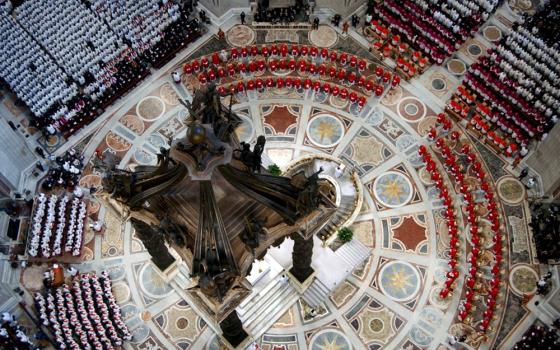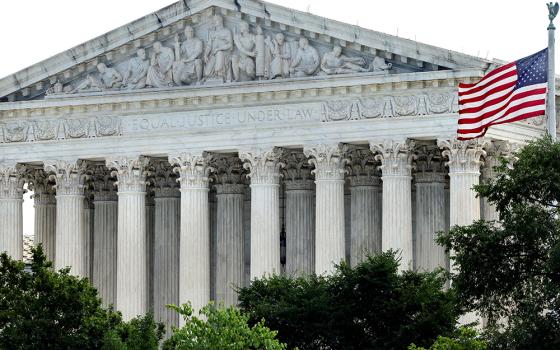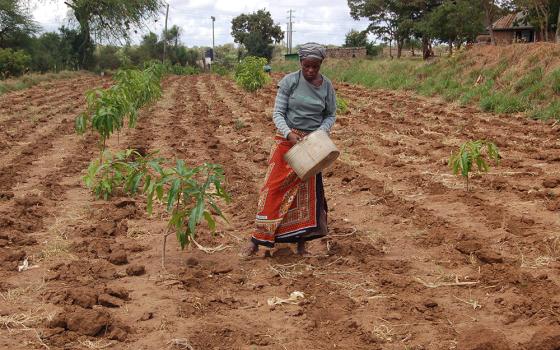The Glenstal Ecumenical Conference, which celebrates its 50th anniversary this year, is the oldest and most successful interdenominational* gathering between Roman Catholics and Protestants in Ireland. But a senior prelate's decision to not allow the conference to offer a shared Eucharist as part of its anniversary observance has placed its future in doubt.
Attendees of the jubilee conference, held June 25 to 27, were told that the archbishop of Cashel and Emly, Dermot Clifford, twice refused to grant official permission for a shared Holy Communion service in his diocese. Citing a "conservative" opinion from a canon lawyer, Clifford said it was not in his power to grant the permission. The apostolic nuncio to Ireland, New York-born Archbishop Charles Brown, supported Clifford's decision.
It was on June 26, 1964, some months ahead of the Second Vatican Council's promulgation of its Decree on Ecumenism, that members of the Anglican Church of Ireland and other Christian denominations, including Presbyterians and Methodists, met with Roman Catholics for the first time in Ireland. The conference met at Glenstal Abbey in County Limerick and has been held every year since then.
Hosted by the Benedictine community, the conference is organized by a committee of various Christian communities and chaired by the Episcopalian church bishop of Limerick, Trevor Williams.
A high point was reached in 1985 at the conference's 21st anniversary, when the then-archbishop of Cashel and Emly, the late Thomas Morris, and authorities from the four other participating denominations gave permission for a eucharistic celebration based on an agreed text.
Fr. Mark Patrick Hederman*, the abbot of Glenstal, presented a report of behind-the-scenes correspondence with church authorities at a session called "Towards a shared Eucharist: the process on which we are engaged."
Hederman told the 80 people in attendance that conference organizers sought diocesan approval for a shared Eucharist to celebrate 50 years of togetherness. He said the organizers "wanted to rattle the bars and test the boundaries and at least find out what the official position was about Eucharistic-sharing."
Hederman said he wrote to Clifford on Sept. 4, requesting permission for a Eucharist shared by all participants for this "unique" occasion. This one-off celebration of the Eucharist, he said, was provided for in the Irish bishops' document "One Bread One Body," which the standing committee had studied, he said he told the archbishop.
"We realize that this second occasion will not be possible without your gracious permission," Hederman wrote. "We have no interest in, or intention of, celebrating such a Eucharist without the consent of the recognized authorities in the Church. Appropriate contact is also being made with authorities in the other churches.
"We believe that such a symbolic occasion would be a milestone in the search for Christian unity in our country at this important time."
On Dec. 3, Hederman said he received Clifford's reply, which included a report from a canon lawyer. "I do not have the authority to grant the request which you made in regard to the Fiftieth Anniversary of the Glenstal Ecumenical Conference," Clifford wrote.
"I would recommend that you do not have a Mass but that you have a Prayer Service if you have some difficulty with the Church's ruling on the subject. I am sorry to disappoint you but you will see from the Report that it is not in my power to accede to your request."
Clifford's in-house canon lawyer said the Vatican's Congregation for the Doctrine of the Faith has jurisdiction over intercommunions with "ecclesial communities." Any cleric defying that ban, the canon lawyer said, could incur a severe penalty, not excluding dismissal from the clerical state.
Hederman said "the only chink of light in an otherwise negative and, indeed, threatening response" was Clifford's observation that the organizers were free to appeal his decision to the Vatican's Congregation for Divine Worship and the Discipline of the Sacraments.
Hederman then posed the question to Brown. On Jan. 14, Brown, a former official with the Congregation for the Doctrine of Faith, wrote that he could find nothing wrong with Clifford's opinion. Brown said, however, that Hederman was "most free" to bring this question directly to the Vatican's attention.
Methodist and conference secretary Gillian Kingston explored this second window of opportunity. She contacted Bishop Arthur Roche of Leeds, secretary of the Congregation for Divine Worship and the Discipline of the Sacraments, who said Clifford had "clear" authority to make the decision. He recommended Hederman write again to Clifford.
Hederman did just that on Feb. 13, this time telling Clifford that a shared Eucharist at Glenstal would be "an important sign, especially at this time of violence again in Northern Ireland where children of seven years of age will not stand beside on another because one is a Catholic and the other a Protestant."
"A symbolic, once-off, coming together in communion of the four major denominations of Christianity in this country after 50 years of effort to do so, would seem to be an apposite gesture at this important time, when all the political efforts to achieve harmony could be in danger of regression to the former situation of unbridled violence from both sides."
Again, Clifford said no.
Hederman did not criticize Clifford at the conference, saying he did not want Clifford to be seen as "the spoilsport who ruined our party."
"We are dealing here with the institution of the Catholic Church and we decided, as a committee, from the outset to take on this august body in our search for ecumenical communion. Dermot Clifford was, at all times, as he always does, following the norms of Catholic teaching and Canon Law. He has been a very good friend to this community for the 25 years he has been Archbishop of our diocese, and indeed before that."
After lengthy debate, the Glenstal community and the organizing committee decided the conference will not be held in 2014, giving the members a year of reflection on its relevance and role in a multicultural and increasingly secularized society in Ireland.
Noel Coghlan, an Episcopalian theologian and longtime participant in the conference, said he regretted Clifford's decision but said while defying it would be welcome in Ireland, it would be received with hostility in Rome. He said it is better to stay within existing official boundaries but warned that "a blank year" carried the danger of the conference falling further apart.
Kingston disputes the idea that the future of the conference is in danger. “The decision of the Archbishop of Cashel has not placed the future of the Conference in doubt. The 50th anniversary of any event is a time at which to take stock and to consider future direction,” Kingston wrote in an email to NCR July 18. "The event of 2014 will be a time of such thought and prayer and its shape will reflect that task.”
Hederman defended the year off. "The great danger is that by continuing to meet as we do, without kicking up too much of a fuss, that we provide an alibi for the institutional churches of this country and an excuse for not moving forward ecumenically. It is sufficient for the various authorities to throw some money at us and then to say that Glenstal is looking after our ecumenical obligations.
"Well, the truth is that it is not; and, indeed, the question needs to be asked as to whether the Roman Catholic church is really serious about church unity."
In the meantime, the focus will be on whether and how Clifford and Brown explain this decision to the Rome of Pope Francis.
Veteran theologian Ausgustinian Fr. Gabriel Daly was emphatic that the Glenstal Conference would return and that there is "no upstairs and downstairs" in Pope Francis' vision of the Kingdom of God.
*An earlier version of this story had three factual errors: The proper spelling of the abbot's name is Hederman; the Glenstal conference is interdenominational, not interfaith; and the Church of Ireland is part of the Anglican Communion. NCR regrets these errors.
[John Cooney is a Dublin-based journalist and historian.]




